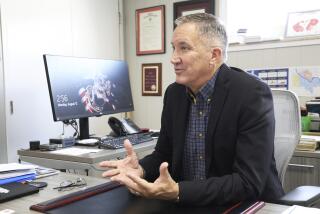Iowa Seeks Change, but Conservatives Want Schools Run Strictly by the Book
- Share via
WATERLOO, Iowa — Robbed of their summer vacation by Midwest flooding, Iowa schoolchildren have returned to classrooms amid a torrent of rhetoric over the future of public education.
Scores of school districts are immersed in the debate over a broad educational agenda called “reform” by its advocates and “New Age thinking” by its conservative adversaries. The way each group talks, a victory for the other side would be as calamitous as a levee break.
Reform advocates include a majority of the state’s 31,000 teachers, school board members and their legislative allies. They cite increased poverty and other social woes as reasons for backing Iowa Department of Education plans to expand school health clinics, increase vocational training and add more school counselors for the state’s half-million elementary and secondary students.
“Everything around the school is changing, so we have to change our approach to education,” said Bill Sherman, spokesman for the teachers’ union, the Iowa State Education Assn.
On the other side are conservative critics such as Elaine Jaquith, a housewife and school board member in Waterloo who rakes reformers on a weekly TV show. “Iowa schools are moving to a social agenda and away from academics,” she says. “They’re not listening to the parents and the taxpayers.”
In Waterloo, battles over moral values and tax accountability flare regularly at school board meetings and on the local access TV channel. Similar debates rage in Sioux City, Davenport and towns such as Ottumwa and Ft. Madison, where social life is tied to the PTA and high school football.
Many conservative Iowans, including a minority of school board members, side with Jaquith and other vocal opponents of reform. The anti-reform faction calls for back-to-basics curricula, tax cuts and family values espoused by such political conservatives as Patrick J. Buchanan and evangelist Pat Robertson. However, they are neither centrally organized nor always allied with the religious right.
Money is a pivotal issue. Some anti-reform groups have teamed with farmers and taxpayer-rights groups to challenge school spending for anything but traditional courses.
With the debate as a backdrop, the state Legislature disappointed educators last year by scrapping a longstanding school funding formula and boosting state aid only 4% to $1.2 billion. That forced half the school districts to exercise their option to increase property taxes.
Distrust between warring factions has grown in the past year. Sherman calls opponents of reform “extremists who don’t want to change.” Jaquith says teachers and education officials think students should “focus on feeling good about yourself, not academics.”
School superintendents such as Joseph Scalzo in Ottumwa are caught in the middle. He must offer sex education--as mandated by the state--but must also take the heat from its opponents. He also has to handle objections to group counseling, library books such as “Catcher in the Rye,” and a grading system that uses check marks instead of letter grades.
“We have a number of parents, citizens and religious leaders who are concerned about whether our teachers promote ‘New Age thinking’ or values other than family values,” Scalzo said. “We’re trying to at least listen and find common ground.”
A recent teachers’ union survey of superintendents and local educators found that 12% of respondents said teachers had been “intimidated” by critics. A common concern is that the complaints have hurt the education system’s credibility among taxpayers, especially the 75% of Iowa adults who have no children in school.
In Ft. Madison, junior high teacher Rachel Stuart is concerned that opponents of reform who won election to the school board as write-in candidates want to erase the special levy for learning disabled students.
Last month, each side took a political hit. Voters in several towns, including Waterloo, turned away anti-reform candidates for local school boards. But at the same time, the reform-minded state education director, William L. Lepley, resigned to head a private school in Pennsylvania.
Leaders on both sides plan to update their battle strategies after California’s school voucher referendum on Nov. 2.
“We’re hoping California passes vouchers,” Jaquith said. “That’s the only thing that’s going to make the education people back down from the reform that’s backfired on them.”
More to Read
Sign up for Essential California
The most important California stories and recommendations in your inbox every morning.
You may occasionally receive promotional content from the Los Angeles Times.













